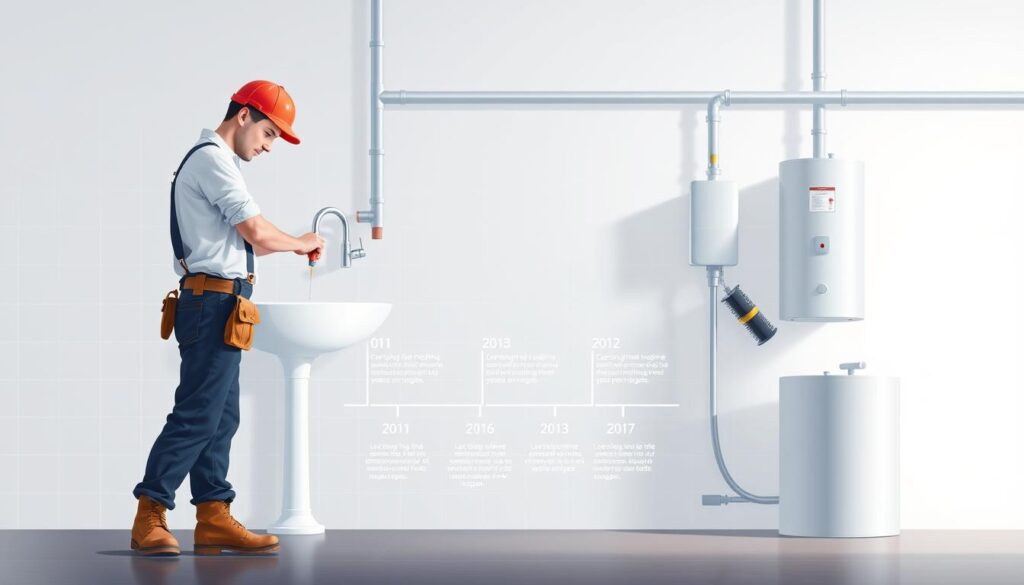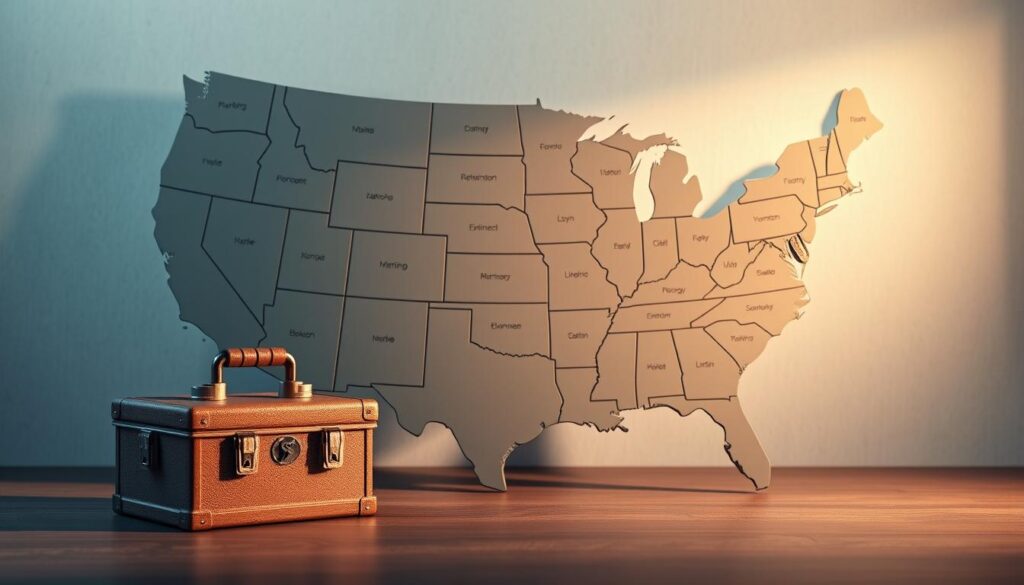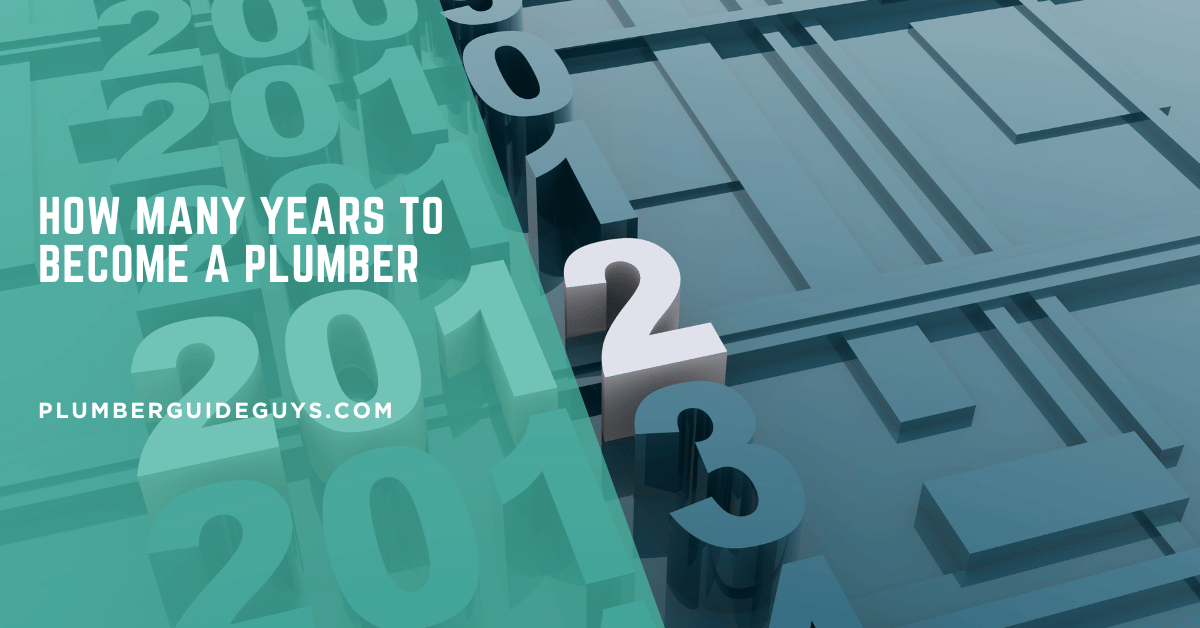Affiliate Disclosure
Plumber Guide Guys is a participant in the Amazon Services LLC Associates Program, an affiliate advertising program designed to provide a means for sites to earn advertising fees by advertising and linking to Amazon.
Did you know the plumbing industry makes over $124 billion a year in the U.S.? To become a professional plumber, you need a lot of dedication and planning. It usually takes 4-5 years, with both school and hands-on training.

How Many Years to Become a Plumber? The path to becoming a plumber has many important steps. You’ll go through school, apprenticeships, and get your license. These steps help you learn all the technical skills you need.
Knowing how long it takes to become a plumber helps you plan your career. You’ll learn how to install, fix, and maintain pipes in homes and businesses. Each step of your training prepares you for these tasks.
Key Takeaways
- Plumbing career requires 4-5 years of training
- Includes education, apprenticeship, and certification
- Potential for high earnings and stable career growth
- Technical skills are developed through structured learning
- Licensing requirements vary by state
Table of Contents
Understanding the Plumbing Career Path
Exploring a career in plumbing opens up a world of exciting opportunities. The plumbing industry offers diverse paths for skilled professionals. Plumbing certification time and plumber apprenticeship length vary, but they provide a solid foundation for long-term success.
Plumbing Specializations
Plumbers can choose from several specialized areas. These areas cater to different interests and skills:
- Residential Plumbing
- Commercial Plumbing
- Industrial Plumbing
- Pipeline Construction
- HVAC Systems
Career Opportunities
Your plumbing career can take multiple exciting directions. You might work for:
- Construction companies
- Municipal water systems
- Private maintenance firms
- Self-employment as an independent contractor
Industry Growth and Demand
The Bureau of Labor Statistics projects a promising future for plumbers. With a 6% job growth expected over the next decade, this career offers stability and growth. States like California, Texas, and Florida show high demand for skilled plumbing professionals.
Plumbing is not just a job, it’s a career with endless possibilities for growth and success.
Your plumber apprenticeship length typically ranges from 4-5 years. This provides thorough training in both practical skills and theoretical knowledge. This structured approach ensures you become a highly qualified professional ready to tackle complex plumbing challenges.
Basic Requirements and Prerequisites
To start your journey to become a professional plumber, you must meet certain requirements. It’s important to know these basics if you’re interested in this career.
Before you begin, you need to meet some key qualifications. These ensure you’re ready for the job’s challenges and duties.
- Minimum age requirement: Must be at least 18 years old
- Educational background: High school diploma or GED
- Physical fitness: Ability to lift heavy equipment and work in challenging environments
- Legal eligibility: Clean criminal background check
When thinking about how long it takes to become a plumber, remember the preparation is key. The initial steps lay the groundwork for your career.
| Requirement Category | Specific Details |
|---|---|
| Age Requirement | 18 years or older |
| Education | High school diploma or equivalent |
| Background Check | Clean criminal record |
| Physical Capabilities | Good physical health and strength |
Meeting these plumbing license requirements shows your commitment to the trade. Each step is designed to help you succeed in your plumbing career.
“Success in plumbing begins with meeting the right prerequisites and showing genuine commitment to the craft.” – Professional Plumbing Association
Tip: Start preparing early by focusing on physical fitness, educational requirements, and developing a strong work ethic.
Educational Foundation for Plumbers
Starting a plumbing career needs a solid educational base. This foundation prepares you for plumbing’s technical hurdles. Knowing your educational options helps you choose wisely for your career.
The length of plumber training varies by your educational path. Most future plumbers look at different options to learn the skills needed for success.
High School Diploma Requirements
Getting a high school diploma or equivalent is your first step. Important subjects include:
- Mathematics
- Physics
- Shop classes
- Computer technology
Trade School Options
Trade school programs last from 12 weeks to 2 years. They give you the skills needed for starting jobs in plumbing.
- Accelerated programs: 12-16 weeks
- Standard trade school programs: 1-2 years
- Comprehensive curriculum covering technical skills
- Hands-on training with professional equipment
Community College Programs
Community colleges are another great choice for plumbers. They offer:
- Associate degree options
- Broader technical education
- Potential for transfer credits
- Lower cost compared to private trade schools
Choosing the right education depends on your goals, time, and money. Each path has its own benefits for a plumbing career.
How Many Years to Become a Plumber

Becoming a professional plumber takes a lot of time. It usually takes 4-5 years to get fully licensed, depending on your path and local rules. You’ll go through many stages that help you grow as a plumber.
The length of your plumber apprenticeship depends on several things. Most plumbers follow a set path:
- Trade school or pre-apprenticeship training: 12-24 months
- Apprenticeship program: Typically 4-5 years
- Licensing and certification: 6-12 months
Getting to be a plumber is tough. You’ll learn a lot of technical skills and safety rules. Comprehensive plumbing programs make sure you’re ready for your career.
| Training Stage | Duration | Key Focus |
|---|---|---|
| Educational Preparation | 1-2 years | Fundamental technical knowledge |
| Apprenticeship | 4-5 years | Practical skills and on-job training |
| Licensing Process | 6-12 months | Certification and professional qualification |
Your time to become a plumber might change based on state rules, how hard you work, and your goals. Being patient and dedicated is key to making your apprenticeship worth it.
The Apprenticeship Journey
To become a professional plumber, you need a detailed apprenticeship. It mixes hands-on training with classroom learning. This path usually takes 4-5 years, combining practical experience with technical education.
The length of a plumber apprenticeship is set to help you learn both practical and theoretical skills. You’ll learn through two main ways:
On-the-Job Training Components
You’ll work with experienced plumbers during your apprenticeship. You’ll learn real-world skills such as:
- Installing water and drainage systems
- Reading technical blueprints
- Understanding safety protocols
- Using specialized plumbing tools
Classroom Instruction Requirements
Classroom learning is also a key part of your training. It covers important technical knowledge like:
- Mathematics for plumbing calculations
- Building code regulations
- Pipe system design principles
- Advanced technical training
| Training Component | Annual Hours | Total Program Duration |
|---|---|---|
| On-the-Job Training | 2,000 hours | 8,000-10,000 hours |
| Classroom Instruction | 144 hours | 576-720 hours |
“An apprenticeship is your pathway to becoming a skilled professional plumber, combining practical experience with technical education.” – Professional Plumbers Association
After this detailed apprenticeship, you’ll go from a beginner to a skilled plumber. You’ll be ready to face complex challenges in the industry.
Journeyman Plumber Certification Process
Becoming a certified journeyman plumber is a big step in your plumbing career. It takes several years of hard work and learning. You’ll need to prepare well and meet certain experience needs to get plumbing certification in California.
The time needed for plumbing certification is designed to help you learn a lot. Most places require a four-year apprenticeship. This includes both classroom learning and practical training.
- Complete a 4-year apprenticeship program
- Accumulate minimum required work hours
- Pass the journeyman plumber licensing examination
- Demonstrate technical proficiency
While getting certified, you must keep a detailed record of your work hours. Each state has its own rules for tracking and checking your hours. The licensing test will cover important topics like:
| Exam Category | Key Focus Areas |
|---|---|
| Technical Knowledge | Plumbing codes and regulations |
| Practical Skills | Installation and repair techniques |
| Safety Protocols | Workplace and equipment safety |
Passing the journeyman plumber certification can lead to more job chances and better pay in plumbing.
Master Plumber Requirements and Timeline
Becoming a master plumber is the top achievement in plumbing. It shows you’re an expert and dedicated to your work. To get there, you need lots of education, experience, and licenses.
Getting to be a master plumber takes a lot of time and effort. You’ll spend 3-5 years after becoming a journeyman. This is for more training and gaining experience.
Advanced Training Requirements
To get master plumber status, you must take special training. These courses teach you:
- Advanced technical systems design
- Complex plumbing code interpretations
- Advanced pipe system engineering
- Commercial and industrial plumbing techniques
Experience Milestones
You need a lot of work experience to become a master plumber. Here are some key steps:
| Experience Level | Years Required | Key Responsibilities |
|---|---|---|
| Apprentice | 4-5 years | Basic skill development |
| Journeyman | 2-3 years | Independent project management |
| Master Plumber | Additional 2-3 years | Advanced system design and supervision |
Licensing Examination Process
The last step is passing a tough licensing exam. This test checks your:
- Technical knowledge
- Code compliance understanding
- Advanced problem-solving skills
- Project management capabilities
Passing this exam makes you a master plumbing professional. It opens up new career paths and raises your salary.
State-Specific Licensing Requirements

Getting a plumbing license can be tricky because each state has its own rules. These rules affect how long it takes to become a plumber. It’s important for those starting their plumbing career to know these differences.
Plumbing licenses vary a lot in the US. Some states have strict rules, while others are more relaxed.
- California requires 4 years of apprenticeship training
- Texas mandates specific examination procedures
- Florida distinguishes between certified and registered plumbers
- New York implements strict continuing education requirements
How long it takes to get a plumbing license depends on your state’s rules. Key things to consider include:
- Minimum education needed
- How long the apprenticeship lasts
- The type of exams you need to pass
- Requirements for ongoing learning
| State | Apprenticeship Years | Exam Requirements | License Type |
|---|---|---|---|
| California | 4 years | State-specific trade exam | Journeyman |
| Texas | 4-5 years | Technical and business exam | Tradesman |
| Florida | 4 years | Local municipality certification | Registered/Certified |
Pro tip: Always check with your state’s licensing board for the most current plumbing license requirements to ensure compliance and smooth career progression.
Continuing Education and Professional Development
Keeping up with the plumbing industry is key to staying ahead. Getting certified is just the start. Your career will grow with ongoing learning.
Most states require plumbers to keep their skills sharp. This means staying updated with new tech, safety rules, and laws. You’ll need to:
- Renew your license every year
- Complete specific hours of continuing education
- Take part in special training workshops
Each state has its own rules. Some need 8-16 hours of training each year. These courses cover important topics like:
- Advanced tech systems
- Safety rules
- Green plumbing methods
- Business management skills
Getting extra certifications can really help your career. Specialized training in areas like solar water systems or commercial plumbing can set you apart.
Professional growth is not just about meeting requirements, but expanding your expertise and value in the plumbing industry.
By always learning, you stay at the top of your game. You’ll keep up with new trends and stay ahead of the competition.
Career Advancement Opportunities
Being a plumber opens up many exciting paths for growth. The journeyman plumber timeline is a great start for exploring different opportunities. You can turn your basic skills into many rewarding careers.
Your advancement options include:
- Specialization in specific plumbing areas
- Management roles within plumbing companies
- Independent business ownership
- Plumbing contractor licensing
Getting good at certain plumbing areas can really boost your career. Some of the most profitable specializations are:
- Solar water heating systems
- Commercial pipeline infrastructure
- Green technology installations
- Industrial maintenance
Master plumber education helps you get ready for starting your own business. Many plumbers become successful business owners. This requires good planning, technical skills, and customer service.
Progressing in your career means moving from apprentice to journeyman, and maybe to master plumber. Each step brings more responsibility, better pay, and more respect in your field.
Success in plumbing comes from continuous learning and adapting to industry innovations.
Conclusion
Choosing to be a plumber is a smart career move with lots of promise. It takes 4-5 years of education, apprenticeship, and getting licensed. You’ll learn important technical skills and gain practical experience.
Working hard to meet plumbing license needs is key to your success. The plumbing field offers steady jobs, good pay, and chances to move up. With the right training and experience, you’ll become a valuable asset in a growing industry.
The plumbing job market is looking up, with more need for skilled workers. Staying up-to-date with new methods and technologies is essential. Plumbers who keep learning will lead in this vital field.
Being a licensed plumber is more than a job—it’s a chance to build a lasting career. Your work will help keep our society running smoothly. It’s a career that’s both rewarding and financially stable.

